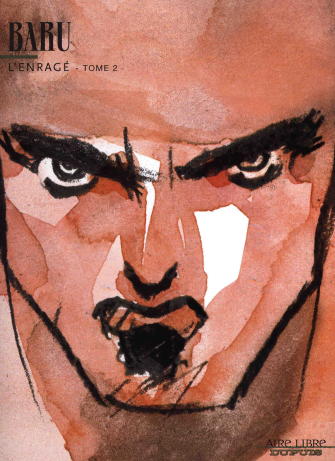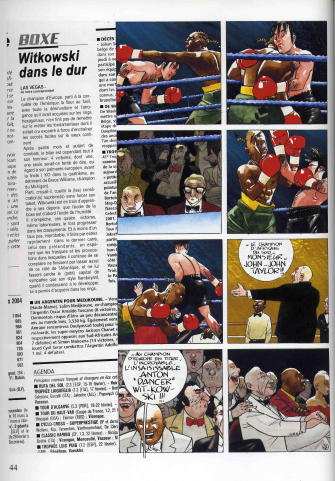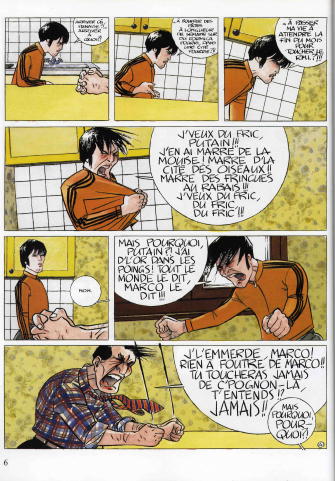 Home > Bart Beaty's Conversational Euro-Comics
Home > Bart Beaty's Conversational Euro-Comics Bart Beaty Reviews L’Enrage, by Baru
posted August 10, 2007
Bart Beaty Reviews L’Enrage, by Baru
posted August 10, 2007

_thumb.jpg)

The covers of the
two volumes of
Baru's
L'Enrage (Dupuis 2004, 2006) feature close-ups of the title character, a sort of before and after image of menacing anger. Drawn in strikingly bold and aggressively heavy pencils, and fleshed out with jagged watercolors, the images convey with great accuracy both the theme of the work and the power with which the story is told.
L'Enrage tells the tale of Anton Witkowski, a Polish boxer living in the French suburbs. Alienated from his father, and from society in general, he sets his mind on becoming the world champion because he is good with his fists and craves money. He is an arrogant athlete caught up in an uncaring and corrupt world, and he fights with bitterness and, as the title suggests, a great deal of rage.

Baru's portrait of contemporary boxing is scathing. If his previous boxing work,
The Road to America (with
Thevenet), suggests a genuine passion for the sport,
L'Enrage details a sickness that threatens to overwhelm the characters. Baru locates this sickness in the heart of America, where corrupt promoters (
Don King, here lightly fictionalized as "Duke") engage in complex plots against independent boxers. The story of these books traces Witkowski's rise through the boxing ranks, and an elaborate frame-up that causes his fall. The story is an elaborate melodrama with
Rubin Carter-esque overtones, but it also aims at broader questions.
Baru has always been one of the most politically engaged of contemporary European cartoonists, so it is no surprise that he paints a picture of France that is just as mendacious as the sport of boxing. The author incorporates authentic news coverage of his fictional characters, replete with dead-on accurate covers of real life French newspapers, and the boxing story bleeds over into other realities of contemporary French life, including the civil unrest of 2005. Anton becomes a symbol of the aspirations of France's marginalized populations, tellingly laid low by American economic interests and saved by the mass mobilization of the French people.
All of this plays out in a highly fragmented narrative style. Not only does the author jump backward and forward through time, but time itself is highly fluid. Entire years pass in the context of a page, and we are provided only the faintest glimpses of many of the characters. Couple this with a characteristically slang-filled writing style, and
L'Enrage becomes a thriller that demands close attention to detail. But that attention is richly rewarded. The story always feels real -- so much so that at one point I thought to myself that it must be based on actual events. Even when the melodrama reaches a boiling point and events stretch credulity there is an authenticity in the presentation that gives the book tremendous power.

The ending of
L'Enrage will be familiar to readers of Baru as it recalls the closing pages of several of his works. Politically committed but highly cynical, the artist has trouble reconciling his characters to the society that condemns them, instead choosing to leave them on the run from realities that they might otherwise need to confront. While his characters might be free to escape, his readers are left with the awareness that troubles persist -- our own call to action.


